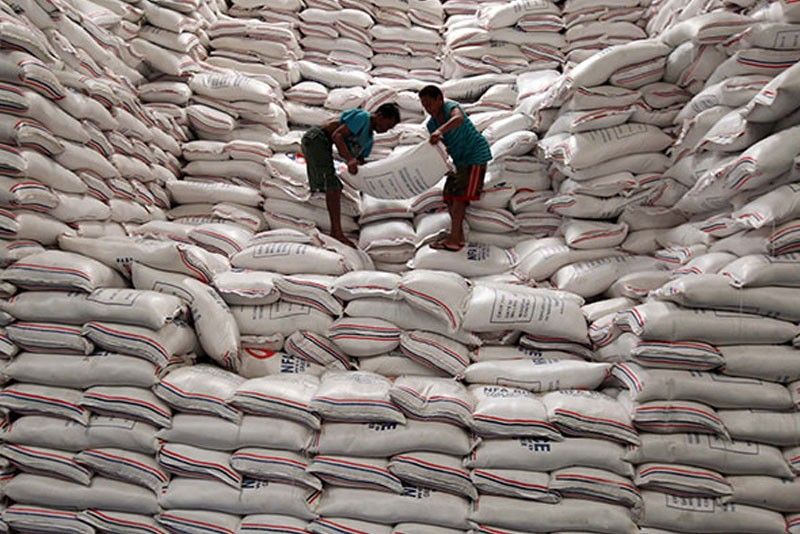Rice imports deferred

MANILA, Philippines - The government has decided to formally defer the importation of 250,000 metric tons of rice despite the continued insistence of the National Food Authority (NFA) to buy from international sources.
NFA administrator Jason Aquino had been pushing for an immediate government-to-government importation of 250,000 MT of rice despite a projected bumper harvest from local farmers.
But during the NFA Council meeting last week, members decided not to approve the NFA’s proposal to import the volume via government-to-government scheme anytime soon.
“We did not receive any approval. If we did, we would have received the letter saying we can proceed with the importation,” NFA spokesperson Marietta Ablaza said.
Bangko Sentral ng Pilipinas (BSP) deputy governor Diwa Guinigundo warned that a government-to-government importation may expose the NFA to further indebtedness.
“I think all of us what to make sure on one hand, the price of rice will be maintained and be stable, while at the same time avoid exposing the NFA to further indebtedness. We are also cognizant of the need to avoid getting more rice when you have the so-called summer harvest coming in,” he said.
Guinigundo serves as the BSP governor’s representative to the NFA Council, which also include the Cabinet Secretary, the NFA administrator, chairman of the Development Bank of the Philippines, president of the Land Bank of the Philippines, finance secretary, trade secretary, the National Economic and Development Authority and a representative of a farmer’s group.
The 250,000 MT of rice is supposed to serve as the country’s buffer stock in preparation for the onset of the lean months.
Under the law, the NFA is tasked to buy the palay produce of local farmers as buffer stock for calamities and other contingencies.
President Duterte already ordered the NFA to prioritize rice purchase from local farmers, but the agency maintained that it can no longer buy more and hit its target following higher prices offered by private traders.
NFA’s field monitoring shows traders are buying palay (unhusked rice) from the summer harvest at an average of P18-P20 per kilogram while the government support price remains at P17 per kg.
The NFA targets to procure 4.6 million bags or about 230,000 MT of palay from local farmers nationwide until yearend to boost buffer stock and rice distribution requirements.
As of the end first quarter, the NFA has bought approximately 21 percent of its 2017 procurement target.
The palay-buying for the first three months of the year is significantly lower by almost 80 percent as it only bought 134,355 bags compared to the 603,915 bags in 2016 due to higher than average farm-gate price of palay.
This year, the agency has a P5-billion budget for the procurement of palay.
The NFA is mandated to maintain a food security reserve good for at least 15 days at any given time.
By July 1, which marks the onset of the lean season for rice, the NFA must have at least a 30-day buffer stock to meet the requirements of victims of calamities and emergencies.
Latest data from the Philippine Statistics Authority (PSA) showed that the country’s rice inventory in March declined by 19 percent to 2.18 million MT, from 2.67 million MT recorded a year ago.
The agency reported that total rice inventory as of March was also five percent lower than the 2.3 million MT posted in February.
‘Rice stock still sufficient’
But Guinigundo allayed fears of a possible uptick in rice prices amid the issues that hound the country’s rice importation, asserting that the country has ample supply until the end of harvest season.
He said based on data from the PSA, the country’s rice inventory is still sufficient for 69 days. This rice buffer would be further augmented by the summer harvest, which will last until June.
“We don’t believe rice prices will move up in a very significant way,” Guinigundo said during a briefing on the country’s first quarter 2017 inflation.
Concerns of a possible rice inflation surfaced as Duterte decided to stop all rice importations in the country. Officials have also argued over rice import policies, whether to import through the private sector or through a government-to-government scheme.
Guinigundo said the government also allows private sector importation through the minimum access volume (MAV) scheme, which is the country’s commitment to the World Trade Organization while its quantitative restriction on rice has not been lifted yet.
In terms of the MAV, some of the rice imported by traders from abroad has not yet entered the country.
“The decision of the council is to extend (MAV) to end-March 2017. But there were issues because some of the rice from abroad has not entered yet. Hopefully, this will be resolved soon so additional supply will be available and that will provide additional support to stability of rice prices,” he added.
With Mary Grace Padin
- Latest
- Trending




























